
Journal of Future Foods
Scope & Guideline
Pioneering research for a healthier future.
Introduction
Aims and Scopes
- Food Quality and Preservation:
Research on methods to enhance the quality and extend the shelf life of food products, including postharvest treatments, packaging innovations, and preservation techniques. - Functional Foods and Nutraceuticals:
Investigation into foods that provide health benefits beyond basic nutrition, including studies on bioactive compounds, their mechanisms of action, and their role in disease prevention. - Food Safety and Technology:
Exploration of advanced technologies for food safety, such as detection methods for contaminants and the use of nanotechnology and molecular approaches to enhance food safety. - Sustainable Food Production:
Focus on sustainable practices in food production, including the use of alternative proteins, functional ingredients from plant sources, and the implications of food systems on health and the environment. - Cultural and Ethnobotanical Studies:
Examination of traditional and culturally significant foods, their nutritional value, and their potential applications in modern diets.
Trending and Emerging
- Plant-Based and Alternative Proteins:
An increasing focus on plant-based ingredients and alternative protein sources, reflecting consumer interest in sustainability and health, alongside research into their functional properties. - Bioactive Compounds and Health Benefits:
Heightened attention on the identification and application of bioactive compounds from various food sources, particularly in relation to their health-promoting effects and potential therapeutic uses. - Food-Tech Innovations:
Emerging research into food technology innovations, including nanotechnology, encapsulation methods, and novel processing techniques aimed at improving food safety and nutritional value. - Microbiome and Gut Health:
A growing trend in studies exploring the relationship between diet, gut microbiota, and overall health, emphasizing the implications for functional food development. - Sustainable and Ethical Food Systems:
An increasing number of publications addressing the sustainability of food systems, ethical considerations in food production, and the socio-economic impact of food choices.
Declining or Waning
- Traditional Food Preservation Techniques:
Research focused on conventional methods of food preservation has decreased, likely due to the rise of more advanced technologies and methods that promise better results. - Single Ingredient Studies:
Papers exclusively examining single food items or ingredients without broader implications for food systems or health benefits have become less common, reflecting a shift towards more integrative studies. - General Nutritional Studies:
While nutrition remains a key area, studies that do not incorporate innovative methodologies or novel food sources are becoming less frequent, as the journal emphasizes cutting-edge research.
Similar Journals

Future Foods
Transforming food science for global impact.Welcome to Future Foods, a cutting-edge academic journal published by Elsevier, dedicated to advancing the field of food science. As a prestigious Q1 journal in the Food Science category, it ranks impressively as #43 out of 389 in Scopus, placing it in the 89th percentile among its peers. Future Foods aims to explore innovative developments in sustainable food systems, novel food products, and the intersection of technology and food production, thus providing a platform for research that addresses global challenges such as food security and nutrition. With its focus on future-oriented solutions and trends in the food industry, this journal is essential for researchers, professionals, and students who are eager to contribute to the discourse around cutting-edge food science. Situated in the Netherlands, the journal serves the international academic community and fosters collaboration and knowledge sharing in the realm of food innovation.
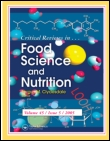
CRITICAL REVIEWS IN FOOD SCIENCE AND NUTRITION
Elevating Standards in Nutrition and Food ScienceCRITICAL REVIEWS IN FOOD SCIENCE AND NUTRITION, published by Taylor & Francis Inc, is a premier peer-reviewed journal dedicated to advancing the understanding of food science and nutrition. With its ISSN 1040-8398 and E-ISSN 1549-7852, this influential journal has established itself as an essential resource in the field, featuring high-quality reviews and critical analyses that foster innovation and knowledge sharing among researchers, practitioners, and academics. Recognized as a Q1 journal in Food Science, Industrial and Manufacturing Engineering, and Medicine (miscellaneous) for 2023, it ranks impressively within the top percentiles of its respective fields, making it a valuable platform for impactful research. Although the journal does not currently offer open access, it continues to attract a readership eager to explore the intricacies of food science and its applications, thereby shaping future advancements in the industry. With an extensive history dating back to 1981 and convergence up to 2024, CRITICAL REVIEWS IN FOOD SCIENCE AND NUTRITION remains committed to providing comprehensive reviews that illuminate contemporary challenges and solutions in the domain of food science and nutrition.
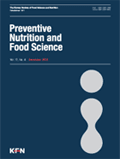
Preventive Nutrition and Food Science
Advancing the Science of Nutrition for a Healthier FuturePreventive Nutrition and Food Science, an esteemed journal published by the Korean Society of Food Science and Nutrition, serves as a pivotal platform for the dissemination of innovative research and insights in the fields of food science, nutrition, and dietetics. With an ISSN of 2287-1098 and an E-ISSN of 2287-8602, this journal is dedicated to advancing knowledge from 2012 through 2024, showcasing contributions that reflect the interplay between nutrition, health, and preventive strategies. Indexed in Scopus, it proudly holds a Q2 ranking in Food Science and a Q3 ranking in Nutrition and Dietetics as of 2023, positioning it among influential publications within these disciplines. Researchers, professionals, and students can explore cutting-edge studies that contribute significantly to evidence-based practices, enhancing public health and nutritional care. Although it operates under a subscription model, the journal plays a crucial role in fostering a deeper understanding of preventive nutrition, advocating for advancements that address contemporary dietary challenges.
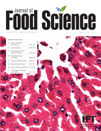
JOURNAL OF FOOD SCIENCE
Transforming Discoveries into Practical SolutionsJOURNAL OF FOOD SCIENCE, published by Wiley, is a premier journal dedicated to advancing the field of food science, bridging the gap between fundamental research and practical application. With an impressive impact factor reflecting its authoritative status, the journal is ranked in the Q1 quartile for Food Science in 2023 and boasts a Scopus ranking of #71 out of 389, placing it in the 81st percentile within Agricultural and Biological Sciences. First launched in 1936, the journal continues to serve as an essential platform for researchers, professionals, and students to disseminate innovative studies and reviews that address critical issues in food quality, safety, and technology. While not currently offering open access, its rigorous peer-review process ensures the dissemination of high-quality and impactful research. Researchers engaged in the vital disciplines of food science will find this journal indispensable for keeping abreast of cutting-edge developments in the field.

Foods is a premier open access journal published by MDPI, based in Switzerland, that has been at the forefront of disseminating high-quality research in the fields of food science, health professions, and plant science since its establishment in 2012. With an impressive convergence of interdisciplinary studies spanning various aspects of food, nutrition, and microbiology, the journal aims to provide a comprehensive platform for researchers and professionals to share innovative ideas and findings. Maintained as a Q1 journal in multiple categories for 2023, including Food Science and Health Professions, Foods has garnered significant recognition within the academic community, reflected in its strong Scopus rankings and percentiles across various disciplines. The journal not only promotes open access to enhance the visibility and accessibility of research but also encourages the exploration of sustainable food systems and health-related issues, thus contributing to essential discussions in today's society. For those looking to advance their understanding and expertise in food-related sciences, Foods serves as an enduring resource for groundbreaking studies and critical insights.

eFood
Connecting researchers to the forefront of food science.eFood is a pioneering journal in the field of food science, published by the esteemed WILEY. With its impactful emergence, the journal has rapidly established itself within the academic community, evidenced by its impressive Q1 category ranking in Food Science as of 2023, and a commendable position at Rank #95 out of 389 in the Scopus database. Covering a wide spectrum of topics related to food innovation, technology, safety, and nutrition, eFood serves as an indispensable platform for researchers, industry professionals, and students who are at the forefront of advancing our understanding of food systems. The journal notably operates with an open-access model, promoting wide dissemination of knowledge while enhancing the visibility of high-quality research. As we look forward to converging years from 2020 to 2024, eFood is poised to foster rigorous scientific discourse and contribute significantly to the future of food science research.

Food and Bioprocess Technology
Elevating Standards in Food Quality and SafetyFood and Bioprocess Technology, an esteemed journal published by Springer, serves as a premier platform for disseminating cutting-edge research in the realms of food science, industrial manufacturing engineering, and process chemistry and technology. Established in 2008, the journal has quickly ascended to the prestigious Q1 quartile in multiple categories, highlighting its impact and relevance within the scientific community. With an impressive Scopus ranking that places it in the top tiers of its fields—such as rank #17 in Safety, Risk, Reliability, and Quality, and rank #38 in Food Science—this journal is pivotal for researchers and professionals aiming to publish innovative findings that advance food processing and bioprocess technology. Beyond its rigorous peer-review process, the journal facilitates access to high-quality, impactful research, reinforcing its significant role in shaping the future of biotechnological applications in food systems. Aimed at both scholars and practitioners, Food and Bioprocess Technology is an essential resource for those engaged in exploring sustainable practices and enhancing food quality and safety. Furthermore, by addressing essential topics in the field, it fosters collaboration and knowledge exchange among researchers dedicated to advancing the bioprocessing landscape.
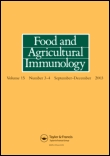
FOOD AND AGRICULTURAL IMMUNOLOGY
Exploring the Intersection of Immunology and AgricultureFOOD AND AGRICULTURAL IMMUNOLOGY, published by Taylor & Francis Ltd, is a distinguished journal dedicated to the intersection of immunology and agricultural sciences, providing valuable insights in areas such as food safety, plant health, and disease resistance since its inception in 1989. Operating as an Open Access journal since 2017, it offers researchers and professionals unrestricted access to groundbreaking studies and reviews that advance the understanding of immunological responses in agricultural contexts. With its current quartile rankings of Q2 in Agronomy and Crop Science and Q3 in Food Science, as well as Q4 in Immunology, the journal has established itself as a vital resource for those aiming to enhance the quality and safety of food production through innovative research. By leveraging its impressive Scopus rankings across various categories, the journal promotes interdisciplinary collaboration and knowledge dissemination pertinent to both scientists and policymakers engaged in the agricultural and food sectors.

Food Production Processing and Nutrition
Advancing the intersection of food science and nutrition.Food Production Processing and Nutrition, published by SpringerNature, stands at the forefront of advancing knowledge in the vibrant fields of food science, nutrition, and public health. This esteemed Open Access journal, operational since 2019, plays a pivotal role in disseminating breakthrough research that intersects food production processes with nutritional insights, making it an invaluable resource for researchers, professionals, and students alike. With a commendable 2023 impact factor reflecting its robust scholarly contributions — Q1 in Food Science and Q2 in both Nutrition and Dietetics and Public Health, Environmental and Occupational Health — the journal not only emphasizes the importance of innovative food processing methods but also addresses pressing nutritional challenges faced globally. Located in the United Kingdom, it claims an impressive Scopus ranking, with a notable percentile standing across various categorical metrics. As such, Food Production Processing and Nutrition is essential for anyone aiming to deepen their understanding of how food systems impact public health through effective processing and nutritional strategies.
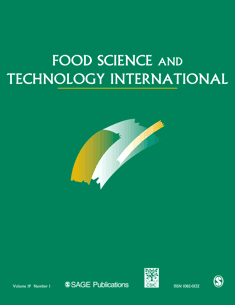
FOOD SCIENCE AND TECHNOLOGY INTERNATIONAL
Pioneering research for a sustainable food industry.FOOD SCIENCE AND TECHNOLOGY INTERNATIONAL, published by SAGE Publications Ltd, is a premier journal in the fields of food science and technology, serving as a crucial platform for the dissemination of innovative research and practical applications from 1995 through to 2024. With an impact factor reflecting its significant standing—ranking in the Q2 quartile for Chemical Engineering, Food Science, and Industrial and Manufacturing Engineering—this journal plays an instrumental role in advancing the interdisciplinary study of food systems. Researchers, professionals, and students can access high-quality contributions that address the latest developments and trends in food technology, safety, and processing. Located in the United States, FOOD SCIENCE AND TECHNOLOGY INTERNATIONAL also boasts commendable Scopus rankings, ensuring its articles are both relevant and widely cited within the academic community. As a vital resource for anyone engaged in food science research, этот журнал fosters knowledge sharing and innovation in the ever-evolving landscape of food technology.